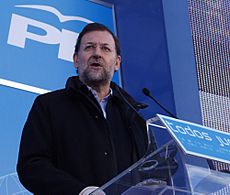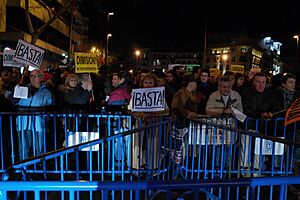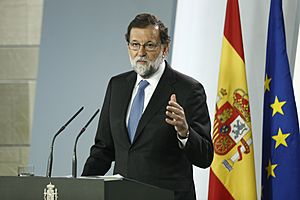Mariano Rajoy facts for kids
Quick facts for kids
Mariano Rajoy
|
|||||||||||||||||||||||||||||||||||||||||||||||||||||||||||||||||||||||||||||||||||||||||||||||||||||||||||||||||||
|---|---|---|---|---|---|---|---|---|---|---|---|---|---|---|---|---|---|---|---|---|---|---|---|---|---|---|---|---|---|---|---|---|---|---|---|---|---|---|---|---|---|---|---|---|---|---|---|---|---|---|---|---|---|---|---|---|---|---|---|---|---|---|---|---|---|---|---|---|---|---|---|---|---|---|---|---|---|---|---|---|---|---|---|---|---|---|---|---|---|---|---|---|---|---|---|---|---|---|---|---|---|---|---|---|---|---|---|---|---|---|---|---|---|---|---|
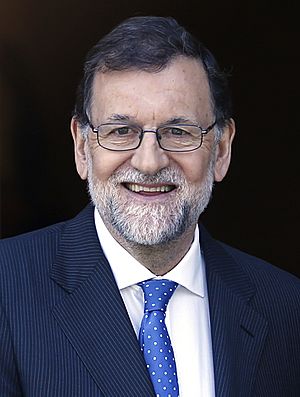
Rajoy in 2018
|
|||||||||||||||||||||||||||||||||||||||||||||||||||||||||||||||||||||||||||||||||||||||||||||||||||||||||||||||||||
| Prime Minister of Spain | |||||||||||||||||||||||||||||||||||||||||||||||||||||||||||||||||||||||||||||||||||||||||||||||||||||||||||||||||||
| In office 21 December 2011 – 1 June 2018 |
|||||||||||||||||||||||||||||||||||||||||||||||||||||||||||||||||||||||||||||||||||||||||||||||||||||||||||||||||||
| Monarch | Juan Carlos I Felipe VI |
||||||||||||||||||||||||||||||||||||||||||||||||||||||||||||||||||||||||||||||||||||||||||||||||||||||||||||||||||
| Deputy | Soraya Sáenz de Santamaría | ||||||||||||||||||||||||||||||||||||||||||||||||||||||||||||||||||||||||||||||||||||||||||||||||||||||||||||||||||
| Preceded by | José Luis Rodríguez Zapatero | ||||||||||||||||||||||||||||||||||||||||||||||||||||||||||||||||||||||||||||||||||||||||||||||||||||||||||||||||||
| Succeeded by | Pedro Sánchez | ||||||||||||||||||||||||||||||||||||||||||||||||||||||||||||||||||||||||||||||||||||||||||||||||||||||||||||||||||
| President of the People's Party | |||||||||||||||||||||||||||||||||||||||||||||||||||||||||||||||||||||||||||||||||||||||||||||||||||||||||||||||||||
| In office 2 October 2004 – 21 July 2018 |
|||||||||||||||||||||||||||||||||||||||||||||||||||||||||||||||||||||||||||||||||||||||||||||||||||||||||||||||||||
| Deputy | |||||||||||||||||||||||||||||||||||||||||||||||||||||||||||||||||||||||||||||||||||||||||||||||||||||||||||||||||||
| Preceded by | José María Aznar | ||||||||||||||||||||||||||||||||||||||||||||||||||||||||||||||||||||||||||||||||||||||||||||||||||||||||||||||||||
| Succeeded by | Pablo Casado | ||||||||||||||||||||||||||||||||||||||||||||||||||||||||||||||||||||||||||||||||||||||||||||||||||||||||||||||||||
|
|||||||||||||||||||||||||||||||||||||||||||||||||||||||||||||||||||||||||||||||||||||||||||||||||||||||||||||||||||
| Member of the Congress of Deputies | |||||||||||||||||||||||||||||||||||||||||||||||||||||||||||||||||||||||||||||||||||||||||||||||||||||||||||||||||||
| In office 20 November 1989 – 15 June 2018 |
|||||||||||||||||||||||||||||||||||||||||||||||||||||||||||||||||||||||||||||||||||||||||||||||||||||||||||||||||||
| Constituency | Madrid (2004-2018) Pontevedra (1989-2004) |
||||||||||||||||||||||||||||||||||||||||||||||||||||||||||||||||||||||||||||||||||||||||||||||||||||||||||||||||||
| In office 7 July 1986 – 4 December 1986 |
|||||||||||||||||||||||||||||||||||||||||||||||||||||||||||||||||||||||||||||||||||||||||||||||||||||||||||||||||||
| Constituency | Pontevedra | ||||||||||||||||||||||||||||||||||||||||||||||||||||||||||||||||||||||||||||||||||||||||||||||||||||||||||||||||||
| President of the Deputation of Pontevedra | |||||||||||||||||||||||||||||||||||||||||||||||||||||||||||||||||||||||||||||||||||||||||||||||||||||||||||||||||||
| In office 11 June 1983 – 10 December 1986 |
|||||||||||||||||||||||||||||||||||||||||||||||||||||||||||||||||||||||||||||||||||||||||||||||||||||||||||||||||||
| Preceded by | Federico Cifuentes Pérez | ||||||||||||||||||||||||||||||||||||||||||||||||||||||||||||||||||||||||||||||||||||||||||||||||||||||||||||||||||
| Succeeded by | Fernando García del Valle | ||||||||||||||||||||||||||||||||||||||||||||||||||||||||||||||||||||||||||||||||||||||||||||||||||||||||||||||||||
| Personal details | |||||||||||||||||||||||||||||||||||||||||||||||||||||||||||||||||||||||||||||||||||||||||||||||||||||||||||||||||||
| Born |
Mariano Rajoy Brey
27 March 1955 Santiago de Compostela, Spain |
||||||||||||||||||||||||||||||||||||||||||||||||||||||||||||||||||||||||||||||||||||||||||||||||||||||||||||||||||
| Political party | Spanish National Union 1970s) People's Alliance (Before 1989) People's Party (since 1989) |
||||||||||||||||||||||||||||||||||||||||||||||||||||||||||||||||||||||||||||||||||||||||||||||||||||||||||||||||||
| Spouse |
Elvira Fernández Balboa
(m. 1996) |
||||||||||||||||||||||||||||||||||||||||||||||||||||||||||||||||||||||||||||||||||||||||||||||||||||||||||||||||||
| Children | 2 | ||||||||||||||||||||||||||||||||||||||||||||||||||||||||||||||||||||||||||||||||||||||||||||||||||||||||||||||||||
| Parents | Mariano Rajoy Sobredo Olga Brey López |
||||||||||||||||||||||||||||||||||||||||||||||||||||||||||||||||||||||||||||||||||||||||||||||||||||||||||||||||||
| Alma mater | University of Santiago de Compostela | ||||||||||||||||||||||||||||||||||||||||||||||||||||||||||||||||||||||||||||||||||||||||||||||||||||||||||||||||||
| Signature |  |
||||||||||||||||||||||||||||||||||||||||||||||||||||||||||||||||||||||||||||||||||||||||||||||||||||||||||||||||||
Mariano Rajoy Brey (born 27 March 1955) is a Spanish politician who was the Prime Minister of Spain from 2011 to 2018. He was a member and the president of the People's Party, a major political party in Spain.
Rajoy became prime minister after his party won the 2011 general election. He was reelected in 2016 but led a minority government, which means his party did not have a majority of seats in parliament. Before becoming prime minister, he held several important jobs in the government under Prime Minister José María Aznar. From 2004 to 2011, he was the Leader of the Opposition.
His time as prime minister was shaped by a major financial crisis in Spain. Many people lost their jobs, and his government had to make difficult decisions to fix the economy. His party also faced serious accusations about how it handled its money, which hurt its popularity. These issues led to the rise of new political parties like Podemos and Citizens.
In 2018, Rajoy was removed from office after losing a vote of no confidence. This is a special vote where parliament decides if it still supports the prime minister. After losing the vote, he resigned as the leader of the People's Party and retired from politics.
Contents
Early Life and Education
Mariano Rajoy was born on March 27, 1955, in Santiago de Compostela, a city in the Galicia region of Spain. His grandfather, Enrique Rajoy Leloup, was a professor who helped create a plan for Galicia's self-government. His father, Mariano Rajoy Sobredo, was a judge.
Rajoy grew up in the city of Pontevedra. Later, his family moved to León, where he went to school for ten years. He studied law at the University of Santiago de Compostela. After graduating, he passed a difficult exam to become a property registrar, a person who officially records who owns land and buildings. He was the youngest person ever to pass this exam.
When he was young, Rajoy was in a car accident that left scars on his face. Since then, he has always worn a beard to cover them. In 1996, he married Elvira "Viri" Fernández Balboa, and they have two children.
Political Career
Rajoy started his political career in his home region of Galicia. He joined a right-wing party called the People's Alliance (AP). In 1981, he was elected to the Galician Parliament. He held several important jobs in the regional government of Galicia.
In 1989, the People's Alliance merged with other parties to become the People's Party (PP). Rajoy became an important member of this new party. He was elected to the national parliament, the Congress of Deputies, in 1989.
Working in the Government
In 1996, the People's Party won the national election, and José María Aznar became prime minister. Rajoy was given several important roles in Aznar's government, called ministries.
- Minister of Public Administration (1996–1999): He was in charge of how the central government was organized.
- Minister of Education and Culture (1999–2000): He was responsible for the country's schools and cultural programs.
- First Deputy Prime Minister (2000–2003): He was the second-most powerful person in the government.
- Minister of the Interior (2001–2002): He was in charge of the country's police and security.
In 2003, Aznar announced he would not run for prime minister again and chose Rajoy to be his successor.
Leader of the Opposition (2004–2011)
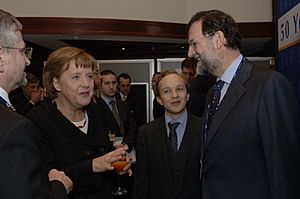
Rajoy led the People's Party in the 2004 general election. Just three days before the election, a series of terrorist bombs exploded on trains in Madrid. The government at first blamed a Basque separatist group called ETA, but it was later found that Al-Qaeda was responsible. The PP lost the election to the Spanish Socialist Workers' Party (PSOE), led by José Luis Rodríguez Zapatero.
Rajoy then became the Leader of the Opposition. His job was to challenge the government's policies. He criticized Zapatero's government on many issues, including its handling of the economy and its foreign policy. The PP lost again in the 2008 election, but Rajoy remained the party leader.
Prime Minister of Spain (2011–2018)
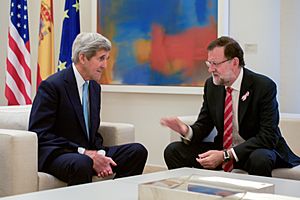
In the 2011 election, the People's Party won a huge victory. Spain was in the middle of a severe financial crisis with millions of people out of work. Voters hoped Rajoy could fix the economy. He became prime minister on December 21, 2011.
First Term (2011–2015)
To deal with the financial crisis, Rajoy's government made large cuts to public spending. This was called an "austerity plan." The government froze the salaries of public workers and stopped hiring new ones, except for police, doctors, and teachers. These cuts were unpopular and led to many protests.
During this time, unemployment in Spain reached a high of 27% in 2012. The government also had to ask for a bailout from Europe to save its banking system.
Problems with Party Funding
In 2013, newspapers published documents that suggested some leaders in the People's Party, including Rajoy, had received secret payments. The party's former treasurer, Luis Bárcenas, was at the center of the scandal. It was said that the party had been taking undeclared money from businesses for many years.
This news caused a huge public outcry. Millions of people signed a petition asking for Rajoy to resign. Rajoy appeared before parliament and said he had made a "mistake" in trusting Bárcenas but denied doing anything wrong. The scandal badly damaged the reputation of the People's Party.
Second Term (2016–2018)
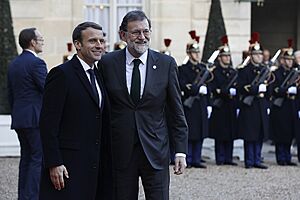
The 2015 election resulted in a hung parliament, where no party had a majority. After months of political deadlock, a new election was held in June 2016. The People's Party won the most seats but still not a majority. Rajoy was able to form a minority government after the main opposition party (PSOE) agreed not to vote against him.
Catalan Independence Movement
One of the biggest challenges of Rajoy's second term was the push for independence in the region of Catalonia. On October 1, 2017, the Catalan government held an independence referendum, which the Spanish government and courts had declared illegal. There were clashes between police and voters at polling stations.
After the Catalan parliament declared independence on October 27, Rajoy's government took an unusual step. It used a special power in the Spanish Constitution to take direct control of Catalonia, remove the regional government, and call for new regional elections.
Losing Power
In May 2018, a court ruled that the People's Party had benefited from an illegal funding scheme. The court's decision said there was a "network of institutionalised corruption" in the party.
Following this ruling, the leader of the opposition, Pedro Sánchez, called for a motion of no confidence against Rajoy. On June 1, 2018, the motion passed, and Rajoy was forced to step down as prime minister. He was replaced by Pedro Sánchez. A few days later, Rajoy announced he was resigning as leader of the People's Party and leaving politics.
Life After Politics
After leaving politics in June 2018, Rajoy returned to his old job as a property registrar in Santa Pola, a town in Alicante.
He has been called to testify in court several times about the funding of the People's Party. In 2019, he appeared as a witness in the trial of the Catalan independence leaders.
Images for kids
See also
 In Spanish: Mariano Rajoy para niños
In Spanish: Mariano Rajoy para niños
 | Laphonza Butler |
 | Daisy Bates |
 | Elizabeth Piper Ensley |


